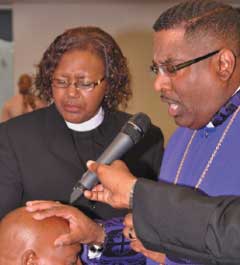 In a recent conversation, I was reminded of a set of questions that Marcus Buckingham developed to measure job satisfaction. This list is several years old, but it still provides great insights. I challenge you to consider going through these questions with your team. (My team will.)
In a recent conversation, I was reminded of a set of questions that Marcus Buckingham developed to measure job satisfaction. This list is several years old, but it still provides great insights. I challenge you to consider going through these questions with your team. (My team will.)
1. Do I know what is expected of me at work?
2. Do I have the materials and equipment that I need in order to do my work right?
3. At work, do I have the opportunity to do what I do best every day?
4. In the past seven days, have I received recognition or praise for doing good work?
5. Does my supervisor, or someone at work, seem to care about me as a person?
6. Is there someone at work who encourages my development?
7. At work, do my opinions seem to count?
8. Does the mission or purpose of my company make me feel that my job is important?
9. Are my coworkers committed to doing quality work?
10. Do I have a best friend at work?
11. In the past six months, has someone at work talked to me about my progress?
12. This past year, have I had opportunities at work to learn and grow?
Which one of those 12 questions challenges you the most? You can check out the rest of the magazine article originally published in Fast Company.
By the way, Buckingham also has a resource available called The Truth about You (Thomas Nelson, 2008). It’s a toolkit including a DVD, interactive book and a “rememo” pad to help you enjoy higher satisfaction with life and work.
Among other things Buckingham confirms, “You’ll never turn your weaknesses into strengths.” I hope that sets you free.
Tony Morgan is the chief strategic officer and founder of TonyMorganLive.com. He’s a consultant, leadership coach and writer who helps churches get unstuck and have a bigger impact. For 14 years, Tony served on the senior leadership teams at West Ridge Church (Dallas, Ga.), NewSpring Church (Anderson, S.C.) and Granger Community Church (Granger, Ind.). With Tim Stevens, Tony has co-authored Simply Strategic Stuff, Simply Strategic Volunteers and Simply Strategic Growth—each of which offers valuable, practical solutions for different aspects of church ministry. His book Killing Cockroaches (B&H Publishing) challenges leaders to focus on the priorities in life and ministry.
For the original article, visit tonymorganlive.com.

 Pastor, you’ve got a sleeping giant in your church. If you awake that sleeping giant, it’ll change your church, your community and the world.
Pastor, you’ve got a sleeping giant in your church. If you awake that sleeping giant, it’ll change your church, your community and the world. We all find ourselves in the position of “leading up” at some point in our lives. Whether it’s in the workplace or where we volunteer, we all have an opportunity to lead our leaders.
We all find ourselves in the position of “leading up” at some point in our lives. Whether it’s in the workplace or where we volunteer, we all have an opportunity to lead our leaders. There’s nothing more challenging interpersonally than dealing with a serious conflict with someone on your church staff or a volunteer in a key position in your ministry.
There’s nothing more challenging interpersonally than dealing with a serious conflict with someone on your church staff or a volunteer in a key position in your ministry. Have you ever heard the phrase “odd man out?” It means you didn’t fit. You don’t measure up for some reason. You were excluded. It hurts.
Have you ever heard the phrase “odd man out?” It means you didn’t fit. You don’t measure up for some reason. You were excluded. It hurts. Have you ever opened your refrigerator and said with passion, “Whoa, what IS that smell? I have and it’s no fun. I quickly launch a breath-holding expedition to find the source of the foul smell that is making everything stink too.
Have you ever opened your refrigerator and said with passion, “Whoa, what IS that smell? I have and it’s no fun. I quickly launch a breath-holding expedition to find the source of the foul smell that is making everything stink too. Are you choosing to be an empowered leader or an empowering one? The results for each one couldn’t be more opposite—or impacting. A leader whose focus is holding on to power will ultimately cause a ministry team to fall apart. A leader who centers on others will grow that team and ultimately develop more leaders who empower others to build the kingdom.
Are you choosing to be an empowered leader or an empowering one? The results for each one couldn’t be more opposite—or impacting. A leader whose focus is holding on to power will ultimately cause a ministry team to fall apart. A leader who centers on others will grow that team and ultimately develop more leaders who empower others to build the kingdom. As a leader, there are many times I feel like the mediator between opposing viewpoints. I’m steering towards a common, shared vision, but there are a myriad of opinions in how we accomplish the vision.
As a leader, there are many times I feel like the mediator between opposing viewpoints. I’m steering towards a common, shared vision, but there are a myriad of opinions in how we accomplish the vision. When considering who should be on the senior leadership team, many times we try to answer the wrong questions. Sometimes we ask, “What positions should be represented on the team?” In the church world, we may think the “Pastor” or “Director” title, or people with certain positions automatically qualify. That’s not always the case.
When considering who should be on the senior leadership team, many times we try to answer the wrong questions. Sometimes we ask, “What positions should be represented on the team?” In the church world, we may think the “Pastor” or “Director” title, or people with certain positions automatically qualify. That’s not always the case. Does God want us to hire a youth pastor? Should we mortgage the church to pay for a remodel? Should I run this new program?
Does God want us to hire a youth pastor? Should we mortgage the church to pay for a remodel? Should I run this new program? This blog was inspired by something Bishop Manny Carlos said about leadership development during our recent Every Nation Asia Leadership Team meeting.
This blog was inspired by something Bishop Manny Carlos said about leadership development during our recent Every Nation Asia Leadership Team meeting. I’ve experienced failures. I’ve watched others fail. I’m guessing you’ve seen plenty as well. This morning I tried to think through some common reasons why failure happens. I’m looking forward to some healthy conversation on this one.
I’ve experienced failures. I’ve watched others fail. I’m guessing you’ve seen plenty as well. This morning I tried to think through some common reasons why failure happens. I’m looking forward to some healthy conversation on this one. Why do you think people leave your church? Why do you think people leave churches in general? We've read reasons (and I've written about these too), such as:
Why do you think people leave your church? Why do you think people leave churches in general? We've read reasons (and I've written about these too), such as: It is tragic when the vast potential of an individual or entity is limited or eliminated because there is no room for their gifts. In the case of a lion, when captured and encaged, it loses its aggressive roar because it is forced to be localized into the confines of a cage.
It is tragic when the vast potential of an individual or entity is limited or eliminated because there is no room for their gifts. In the case of a lion, when captured and encaged, it loses its aggressive roar because it is forced to be localized into the confines of a cage. I can still remember prophecy teachers who tacked rows of charts and diagrams on the church wall and explained spell-binding details of the past, present and future. I cut my spiritual teeth on the Scofield Bible and devoured Hal Lindsey’s The Late Great Planet Earth. My seminary professors instructed me in pre-tribulationism and premillenialism. I quickly categorized anyone who disagreed as a “liberal.”
I can still remember prophecy teachers who tacked rows of charts and diagrams on the church wall and explained spell-binding details of the past, present and future. I cut my spiritual teeth on the Scofield Bible and devoured Hal Lindsey’s The Late Great Planet Earth. My seminary professors instructed me in pre-tribulationism and premillenialism. I quickly categorized anyone who disagreed as a “liberal.” Check out some links below to recent stories from Charisma News that you'll find interesting and informative. You can also sign up to receive stories on your smart phone by signing up for the free Charisma News app by
Check out some links below to recent stories from Charisma News that you'll find interesting and informative. You can also sign up to receive stories on your smart phone by signing up for the free Charisma News app by  I once heard a sermon titled, "The Devil Is in the Details." Recently, I learned that saying is actually derived from an exact opposite quote, "God is in the details."
I once heard a sermon titled, "The Devil Is in the Details." Recently, I learned that saying is actually derived from an exact opposite quote, "God is in the details."

 How to build a healthy, effective ministry team
How to build a healthy, effective ministry team
